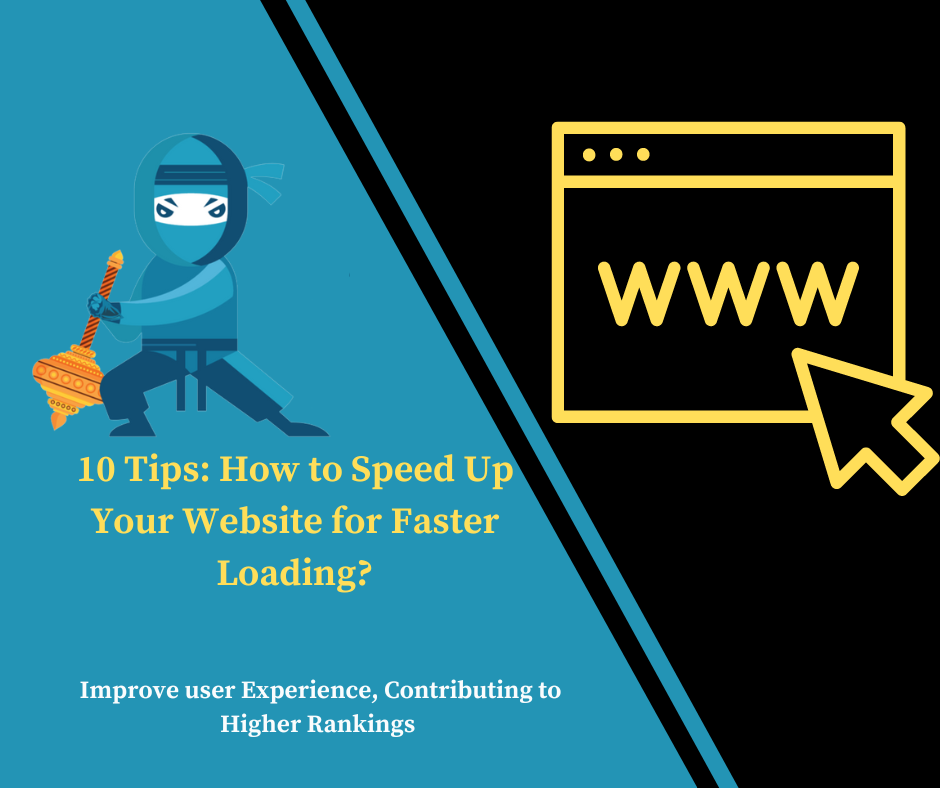10 Tips: How to Speed Up Your Website for Faster Loading
In an era where digital speed and efficiency are paramount, ensuring that your website loads quickly is essential for retaining visitors and boosting your search engine rankings. A slow website can lead to high bounce rates, diminished user satisfaction, and lost revenue opportunities. To address these issues, here are ten effective tips to help you speed up your website and enhance its performance.
1. Optimize Images and Media
Images and media files are often the largest elements on a web page, and they can significantly affect loading times. To speed up your website, ensure all images and media files are optimized for the web. Compress image files using tools like TinyPNG or ImageOptim without compromising quality. Additionally, consider using modern image formats like WebP, which offer superior compression compared to traditional formats such as JPEG and PNG.
Tip: Implement lazy loading to ensure that images and videos are only loaded when they come into the user’s view. This reduces initial load times and improves overall page performance.
2. Leverage Browser Caching
Browser caching stores certain elements of your website on a user’s device so that they don’t need to be reloaded each time the user visits a page. By leveraging browser caching, you can speed up your website for repeat visitors. Configure caching rules through your .htaccess file or via your content management system (CMS) to specify how long certain files should be cached.
Tip: Use tools like Google PageSpeed Insights or GTmetrix to analyze your caching setup and make necessary adjustments.
3. Minimize HTTP Requests
Every element on your webpage, from images to scripts, requires an HTTP request. Reducing the number of these requests can help speed up your website. Combine CSS and JavaScript files where possible to minimize the number of requests. Additionally, remove any unnecessary elements or plugins that may be contributing to excessive requests.
Tip: Use tools like Webpack or Gulp for file minification and concatenation to streamline your website’s code.
4. Enable Compression
Compression techniques such as Gzip can significantly reduce the size of your website’s files before they are sent to users’ browsers. Enabling Gzip compression helps speed up your website by decreasing the amount of data that needs to be transferred. You can enable Gzip compression through your server settings or by adding specific rules to your .htaccess file.
Tip: Check response headers using tools like GTmetrix to verify that Gzip compression is properly enabled.
5. Optimize Your Website’s Code
Efficient code is crucial for website performance. Minify and clean up your HTML, CSS, and JavaScript files to reduce their size and eliminate unnecessary code. Use tools like UglifyJS for JavaScript and CSSNano for CSS to help with minification. Avoid inline styles and scripts, as they can slow down rendering times.
Tip: Regularly review and refactor your code to maintain optimal performance as your website evolves and grows.
6. Use a Content Delivery Network (CDN)
A Content Delivery Network (CDN) distributes your website’s static files across multiple servers located in different geographical locations. This reduces the distance between the server and the user, leading to faster load times. Choose a reputable CDN provider such as Cloudflare, Akamai, or Amazon CloudFront to enhance your website’s performance and reliability.
Tip: Opt for a CDN that offers additional features like DDoS protection and automatic caching to further boost your website’s speed and security.
Also read: How to Boost Sales in Your E-Commerce Store: 10 Proven Tips
7. Optimize Your Server and Hosting Environment
The performance of your hosting service and server setup plays a significant role in your website’s speed. Choose a hosting plan that meets your website’s traffic and performance requirements. For WordPress sites, consider managed WordPress hosting providers that offer optimized environments for better performance.
Tip: Monitor server performance regularly to identify and address issues such as high server load or slow response times, ensuring consistent and reliable website speed
8. Implement Asynchronous Loading for JavaScript
JavaScript files can block the rendering of web page content, leading to delays in page load times. Implement asynchronous or deferred loading for JavaScript files to prevent them from interfering with content rendering. Use the async or defer attributes in your script tags to enable this functionality.
Tip: Test the performance impact of asynchronous loading to ensure it effectively reduces load times without affecting functionality.
9. Reduce Redirects
Each redirect introduces additional HTTP requests, which can slow down your website. Minimize the number of redirects by carefully planning your URL structure and updating internal links. Use tools like Screaming Frog SEO Spider to identify and address unnecessary redirects.
Tip: Ensure that redirects are direct and avoid creating redirect chains or loops, which can further impact performance.
10. Monitor and Analyze Performance Regularly
Website performance optimization is an ongoing process. Regularly monitor your website’s speed and performance using tools like Google PageSpeed Insights, GTmetrix, or Pingdom. Analyzing performance metrics helps you identify areas for improvement and ensure that your optimizations continue to deliver results.
Tip: Set up performance alerts to quickly address significant changes and maintain optimal website speed.
FAQ
Why is it important to speed up my website?
Speeding up your website is vital for improving user experience, reducing bounce rates, and enhancing SEO rankings. Faster websites lead to higher engagement, better user satisfaction, and increased conversions.
How can I check if my website is loading slowly?
Use performance analysis tools like Google PageSpeed Insights, GTmetrix, or Pingdom to evaluate your website’s loading times. These tools provide detailed reports and suggestions for improving performance.
What is lazy loading, and how does it help?
Lazy loading is a technique where images and media files are only loaded as they come into view on the user’s screen. This reduces initial page load times and improves overall site performance.
How frequently should I monitor my website’s performance?
It’s essential to monitor your website’s performance regularly. Aim to review performance metrics at least once a month or after making significant updates to ensure optimal speed.
How does a CDN enhance website speed?
A CDN distributes your website’s static files across multiple servers worldwide, reducing the distance data travels to reach users. This results in faster load times and a better user experience.
What is Gzip compression, and how do I enable it?
Gzip compression reduces the size of text-based files sent from your server to users’ browsers, improving load times. Enable Gzip compression through your server settings or by adding rules to your .htaccess file.
How do I determine if my website’s code needs optimization?
Signs of inefficient code include slow load times and rendering delays. Performance analysis tools can help identify code issues that need optimization.
How can I minimize the impact of JavaScript on loading times?
Implement asynchronous or deferred loading for JavaScript files to prevent them from blocking page rendering. Additionally, minify and combine JavaScript files to reduce their size and impact on performance.
Conclusion
Speed Up Your Website is crucial for providing a positive user experience, improving search engine rankings, and increasing conversion rates. By implementing these ten tips—optimizing images, leveraging caching, minimizing HTTP requests, enabling compression, optimizing code, using a CDN, optimizing your server and hosting environment, implementing asynchronous JavaScript loading, reducing redirects, and monitoring performance—you can effectively enhance your website’s loading times and overall performance.








